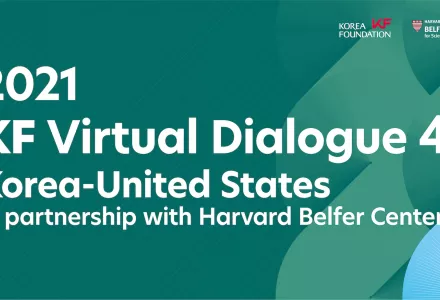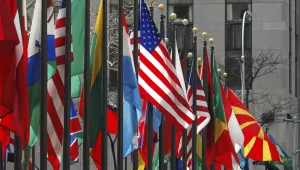Professor Linda Bilmes
Prof. Bilmes, the Daniel Patrick Moynihan Senior Lecturer in Public Policy, is a leading expert on budgetary and public financial issues. Her research focuses on budgeting and public administration in the public, private and non-profit sectors. She is interested in how resources are allocated, particularly defense budgets, costs of war, veterans, sub-national budgeting and public lands. She is a full-time Harvard faculty member, teaching budgeting, cost accounting and public finance, and teaching workshops for newly-elected Mayors and Members of Congress. Since 2005, she has led the Greater Boston Applied Field Lab, an advanced academic program in which teams of student volunteers assist local communities in public finance and operations. She also leads field projects for the Bloomberg Cities program. Prof. Bilmes served as the Senate-confirmed Assistant Secretary and Chief Financial Officer of the U.S. Department of Commerce under President Bill Clinton. She currently serves as the sole United States member of the United Nations Committee of Experts on Public Administration (CEPA), and as Vice-chair of Economists for Peace and Security. She serves on the Board of Directors of the Institute for Veterans and Military Families at Syracuse University. She was a member of the National Parks Second Century Commission and served on the U.S. National Parks Service Advisory Board for eight years. Prof. Bilmes has authored or co-authored numerous books, book chapters, articles and opinion pieces, and has testified to Congress on numerous occasions. Her books include the New York Times bestseller The Three Trillion Dollar War: The True Cost of the Iraq Conflict (with Joseph E. Stiglitz) and The People Factor: Strengthening America by Investing in Public Service (with W. Scott Gould). Her latest book is Valuing the US National Parks and Programs: America's Best Investment (with John Loomis). Prof. Bilmes was featured in the Academy-award nominated documentary “No End in Sight.” She is the recipient of the 2008 “Speaking Truth to Power” Award by the American Friends Service Committee. Prof. Bilmes previously worked as a strategy consultant in London, Madrid, and Moscow with the Boston Consulting Group. She is a member of the Council on Foreign Relations and a Fellow of the National Academy of Public Administration. She holds a BA and MBA from Harvard University and a D.Phil. from Oxford University.
Professor William Clark
Trained as an ecologist, Prof. Clark’s research focuses on sustainability science: understanding the interactions of human and environmental systems with a view toward advancing the goals of sustainable development. He is particularly interested in how institutional arrangements affect the linkage between knowledge and action in the sustainability arena. At Harvard, he currently co-directs the Sustainability Science Program. He is co-author of Pursuing sustainability: A guide to the science and practice (Princeton, 2016), Adaptive environmental assessment and management (Wiley, 1978), and Redesigning rural development (Hopkins, 1982); editor of the Carbon dioxide review (Oxford, 1982); co-editor of Sustainable development of the biosphere (Cambridge, 1986), The earth transformed by human action (Cambridge, 1990), Learning to manage global environmental risks (MIT, 2001), Global Environmental Assessments (MIT, 2006) and The global health system: Institutions in a time of transition (Harvard, 2010); and co-chair of the US National Research Council’s study Our Common Journey: A Transition Toward Sustainability (NAP, 1999). He serves on the editorial board of the Proceedings of the National Academy of Science. He is a member of the National Academy of Sciences and a fellow of the American Association for the Advancement of Science. Prof. Clark is a recipient of the MacArthur Prize, the Humboldt Prize, the Kennedy School’s Carballo Award for excellence in teaching, and the Harvard College Phi Beta Kappa Prize for Excellence in Teaching.
Dr. Francesca Giovannini
Dr. Giovannini is the Executive Director of the Project on Managing the Atom at the Harvard Kennedy School’s Belfer Center. In addition, she is a non-residential fellow at the Centre for International Security and Cooperation at Stanford University. Dr. Giovannini served as Strategy and Policy Officer to the Executive Secretary of the Comprehensive Nuclear Test Ban Treaty Organization (CTBTO), based in Vienna. In that capacity, she oversaw a series of policy initiatives to promote CTBT ratification as a confidence-building mechanism in regional and bilateral nuclear negotiations, elevate the profile of CTBT in academic circles and promote the recruitment of female scientists from the Global South. Prior to her international appointment, Dr. Giovannini served for five years at the American Academy of Arts and Sciences in Boston as Director of the Research Program on Global Security and International Affairs. Working to leverage academic knowledge to inform better policies, she led and promoted countless academic research on issues such as bilateral and multilateral arms control frameworks, regional nuclear proliferation dynamics, and nuclear security and insider threats. With a Doctorate from the University of Oxford, UK and two Masters from the University of California, Berkeley, Dr. Giovannini began her career working for international organizations and the Italian Ministry of Foreign Affairs.
Professor Tae Yong Jung
Prof. Jung is currently a professor at the Graduate School of International Studies at Yonsei University. As an advisor to the ROK Ministry of Economy and Finance’s Committee on Green New Deal, he contributes to green policy formulation. He is the director for the Sustainable Development Program at the Ban Ki-moon Foundation for the Better Future. Currently, he is the Coordinating Lead Author (CLA) of Working Group 3 in the IPCC (Intergovernmental Panel on Climate Change) for the 6th Assessment Report (AR6). He is the CLA for the Climate Investment and Finance chapter. He is also the Chair of the Appeal Committee of the Green Climate Fund (GCF). Previously, he was a professor, KDI School of Public Policy & Management, Republic of Korea; a Principal Climate Change Specialist, Asian Development Bank; the Deputy Executive Director, Global Green Growth Institute (GGGI), Republic of Korea; a Senior Energy Economist, World Bank; the Project Leader, Climate Policy Project, Institute for Global Environmental Strategies, Japan; and Senior Fellow, Korea Energy Economics Institute, Republic of Korea. Prof. Jung is the author of more than 350 academic papers and has given presentations at domestic and international conferences. His main publications are Including Sustainable Development Goals in the Republic of Korea, (Editor) Routledge, London, 2018; and Development Prospects for North Korea, (Co-editor) Routledge, London, 2020. He was educated at Seoul National University (BA) and at Rutgers, The State University of New Jersey (MA and Ph.D.).
Ambassador Hyoeun Jenny Kim
Amb. Kim is Deputy Director-General of the Global Green Growth Institute (GGGI). GGGI is a treaty-based inter-governmental organization supporting developing countries and emerging economies to achieve economic growth and environmental sustainability together by following a new pathway of green growth. She is responsible for managing GGGI’s in-country operations in more than 30 countries, which support low carbon economic growth, including NDC development and implementation. Before joining the GGGI in 2018, she was the Ambassador of the Republic of Korea to Senegal and five neighboring countries from 2016. She contributed to building a strategic development cooperation relationship between Korean and West Africa. During her term, the ROK drastically increased ODA in the region, having launched several new programs on rural development. From 2013 to 2016, she was the Director for Strategy, Policy, and Communication at GGGI. During her term of office, GGGI Strategic Plan 2015-2020 was rolled out. As a career diplomat in the ROK Ministry of Foreign Affairs, she has served as Director for Climate Change and Environment Affairs and Director for World Trade Organization (WTO). She led the national delegation in UN climate change negotiations and WTO DDA negotiations. She also worked for the OECD in Paris and the UN in New York. She earned her Bachelor’s in political science and diplomacy from Yonsei University in Seoul and Master’s from the Jackson School of International Studies at the University of Washington in Seattle. Amb. Kim wrote her first book in 2008, describing the life of a diplomat, entitled A Diplomat Must Be a Multiplayer. Her second book, titled Audacious Challenge to International Organizations, was published in 2013. She supervised the publication of However Long the Night in Korean in 2019.
Dr. Geun Lee
Dr. Lee was appointed President of the Korea Foundation in September 2019. Prior to joining the Foundation, he was a professor of International Relations at the Graduate School of International Studies, Seoul National University, and former Dean of Office of International Affairs, Seoul National University. From 2015 to 2016, he was visiting Super Global Professor at Keio University in Japan. He is also former Chair of the Global Agenda Council on the Future of Korea at World Economic Forum (Davos Forum), and currently a member of the Global Future Council of World Economic Forum. Before joining the faculty of Seoul National University, he served as a professor at the ROK Ministry of Foreign Affairs’ Institute of Foreign Affairs and National Security (which is now part of the Korea National Diplomatic Academy). He also served as President of an independent think tank, Korea Institute for Future Strategies from 2003-2007. His publications include “Clash of Soft Power between China and Japan,” “A Theory of Soft Power and Korea’s Soft Power Strategy,” “The Nexus between Korea’s Regional Security Options and Domestic Politics,” “US Global Defense Posture Review and its Implications on US-Korea Relations.” He co-authored The Environmental Dimension of Asian Security. Dr. Lee received his B.A. in political science from Seoul National University, and M.A. and Ph.D. in political science from the University of Wisconsin at Madison.
Dr. John Park
Dr. Park is Director of the Korea Project at the Harvard Kennedy School’s Belfer Center. At Harvard University, he is also a Faculty Member of the Committee on Regional Studies East Asia, an Associated Faculty Member of the Korea Institute, and a Faculty Affiliate with the Managing the Atom Project. His core research projects focus on the political economy of the Korean Peninsula, nuclear proliferation, economic statecraft, Asian trade negotiations, and North Korean cyber activities. He previously worked at Goldman Sachs and The Boston Consulting Group. Dr. Park presented a TEDxPaloAlto talk in 2019 titled “How North Korea Inc. Evades Sanctions Through Innovation.” Dr. Park’s key publications include: “Stopping North Korea, Inc.: Sanctions Effectiveness and Unintended Consequences,” (MIT Security Studies Program, 2016 – co-authored with Jim Walsh); “The Key to the North Korean Targeted Sanctions Puzzle,” The Washington Quarterly (Fall 2014); “Assessing the Role of Security Assurances in Dealing with North Korea” in Security Assurances and Nuclear Nonproliferation (Stanford University Press, 2012); and “North Korea's Nuclear Policy Behavior: Deterrence and Leverage,” in The Long Shadow: Nuclear Weapons and Security in 21st Century Asia (Stanford University Press, 2008). Dr. Park received his Ph.D. from the University of Cambridge. He completed his pre-doctoral and post-doctoral training at the Harvard Kennedy School’s Belfer Center.



